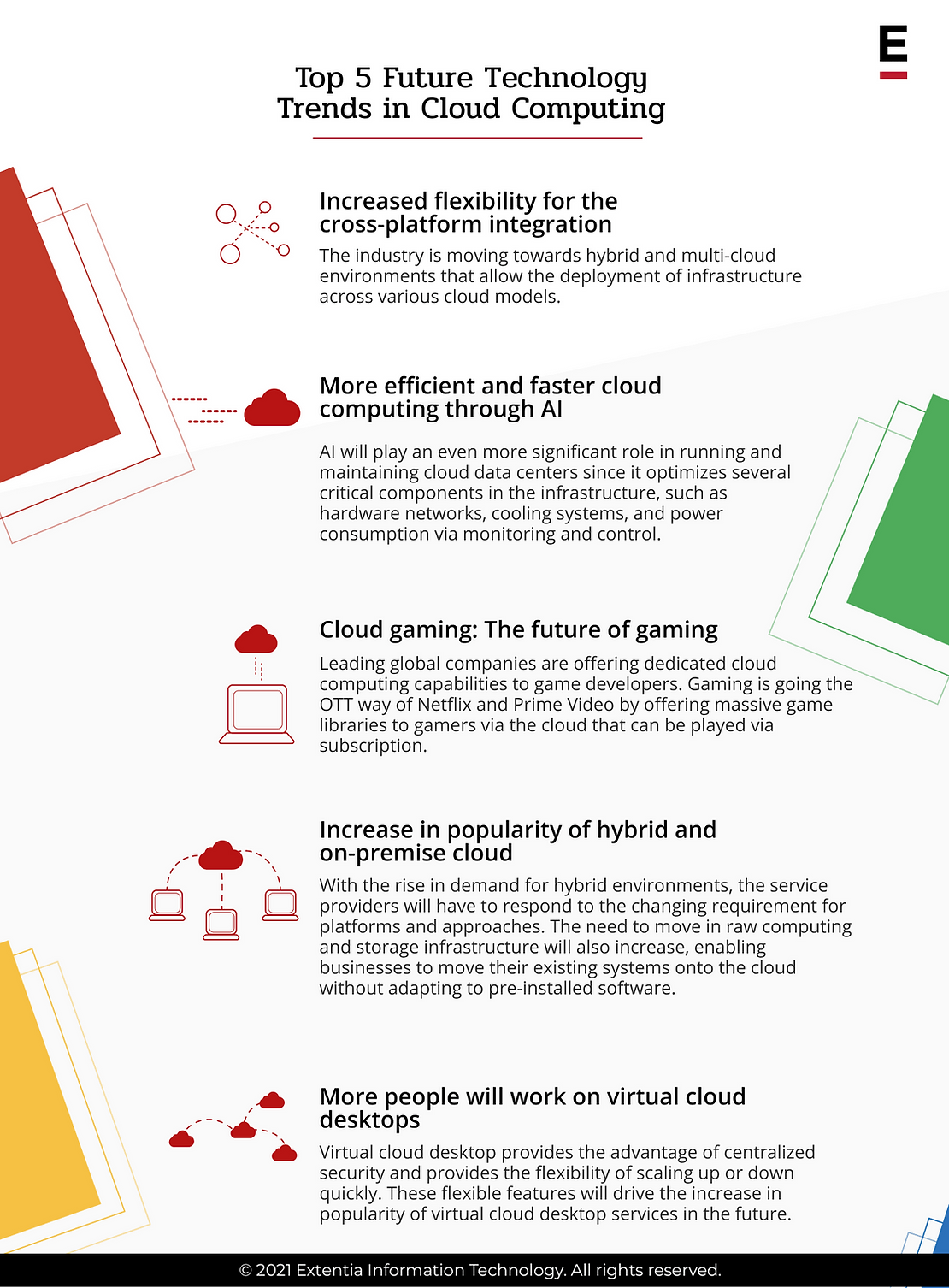Till early last year, the trends in technology were different from what they are today. With COVID-19, businesses were forced to move to remote working models overnight, which brought a host of new challenges with it. To cope with these challenges, organizations quickly started moving their operations to cloud services and applications. Organizations that had already invested in cloud technology could cushion the blows from the disruption. But, many without a cloud-based infrastructure already in place, faced severe challenges in adjusting to the new normal.
When the world changes, it brings disruption and progress both. Cloud computing is rightly emerging as the key technology trend of 2021. It is becoming a technology of choice across industries for driving the app-based technology ecosystem. From healthcare to education, and from manufacturing to gaming, every industry moves its IT infrastructure to the cloud. Here are the future trends in cloud computing that we think will drive the cloud revolution in 2021.
Top 5 Future Technology Trends in Cloud Computing
1. Increased flexibility for the cross-platform integration
The industry is moving towards hybrid and multi-cloud environments that allow the deployment of infrastructure across various cloud models. Leading cloud services such as AWS and Azure have traditionally been closed walled environments, offering their platforms as one-stop-solution for cloud, data, and computing requirements to organizations. This has allowed these giants to upsell cloud capacities with additional services to their increasing customer base.
However, now customers ask these big cloud companies to open their platforms and break the barriers to enable multi-cloud approaches. A collaborative approach enables organizations to access and share data with external stakeholders in the supply chain working on different applications and diverse data standards. The multi-cloud approach trend will also open a new space for start-ups to offer innovative services that create seamless cross-platform collaboration on various cloud platforms.
2. More efficient and faster cloud computing through AI
Artificial intelligence (AI) will be the most impactful application of cloud computing in 2021. Cloud computing has democratized AI capabilities for everyone. Today SaaS and PaaS providers have made AI accessible for every budget and skill level, making this technology available for companies of every size and in any sector. 5G, self-driving cars, cancer research, smart city infrastructure, and crisis response planning are industries that will leverage AI capabilities available via cloud-based infrastructure.
Moreover, AI will play an even more significant role in running and maintaining cloud data centers since it optimizes several critical components in the infrastructure, such as hardware networks, cooling systems, and power consumption via monitoring and control. We can now expect cloud services to be quicker and more efficient as research in this field is progressing faster and giving some significant breakthroughs.
3. Cloud gaming: The future of gaming
One of the fastest-growing industries in the cloud space in 2021 is going to be the gaming industry. Leading global companies such as Amazon and Tencent are offering dedicated cloud computing capabilities to game developers. Moreover, gaming is going the OTT way of Netflix and Prime Video by offering massive game libraries to gamers via the cloud that can be played via subscription.
Rivaling Sony’s PSN network, Nvidia, Google, and Microsoft also launched their cloud gaming services in 2020. Even with the latest PS5 and the Xbox launches, experts believe that the need to spend massive amounts on dedicated gaming hardware will soon be obsolete. Cloud gaming will lead the gaming entertainment industry.
4. Increase in popularity of hybrid and on-premise cloud
Organizations have the option to choose from a public, private, or hybrid cloud environment. Every opportunity offers varying degrees of flexibility, security, performance and has its advantages and disadvantages. Over the last few years, companies have realized the benefits of hybrid cloud environments, forcing service providers to modify their offerings. Hybrid cloud environments allow users to select individual elements from the service providers’ product suite as per their requirements.
Service providers such as Google and Amazon typically offer space to customers on their cloud platforms. At the same time, IBM and Microsoft enable their customers to deploy their technologies and tools on existing on-premise networks. With the rise in demand for hybrid environments, the service providers will have to respond to the changing requirement for platforms and approaches. Furthermore, experts believe that the need to move in raw computing and storage infrastructure will also increase through 2021, enabling businesses to move their existing systems onto the cloud without adapting to pre-installed software.
5. More people will work on virtual cloud desktops
In a virtual cloud desktop, cloud environment and its capabilities are delivered as managed cloud service to users’ laptops or desktop screens. It works on pay by the hour subscriptions that allow organizations to only pay for their employees’ use of the service. This brings savings for businesses as it eliminates the cost of upgrading and maintaining sophisticated hardware.
Virtual cloud desktop offers synchronized and up to date technology, which helps businesses to increase efficiency. It also provides the advantage of centralized security and provides the flexibility of scaling up or down quickly. These flexible features will drive the increase in popularity of virtual cloud desktop services in the future.
With the pandemic rejigging the world and businesses, organizations are realigning their digital strategies. Companies that have been resistant to new technologies have also started to expedite their adoption of cloud services. The year 2021 will see organizations invest in cloud services to increase workforce efficiency, enable innovation, and become future-ready.
At Extentia, we have been designing, maintaining, and implementing applications on the cloud for a long time. Connect with us to know more!
Want the full infographic? Get it here!



